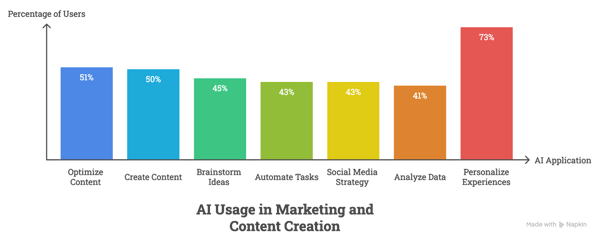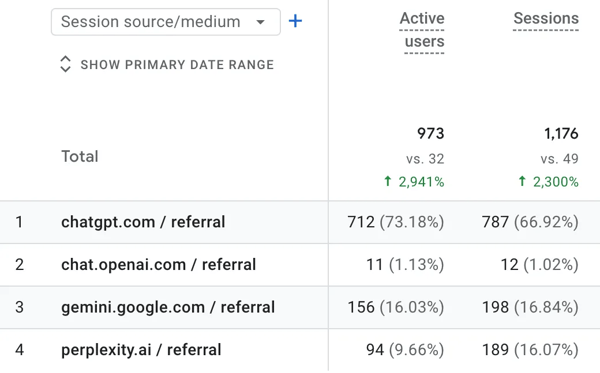October 22, 2025
 by Sagar Joshi / October 22, 2025
by Sagar Joshi / October 22, 2025

The rules of SEO are being rewritten in real time.
Some businesses are flourishing in AI-driven search. Others are vanishing. The difference? How quickly they adapt to this shift. For example, AI in SEO is changing how people discover solutions. Earlier, people would either type or use voice for search queries and navigate to one of the top-ranking pages to find a solution to their query.
The solution is being spoon-fed in AI overviews. This has shortened the audience journey, driving more referral and direct traffic to websites. Businesses are now competing for visibility in AI overviews and chatbots. SEO tools are adapting to help optimize for mentions in LLMs. A lot is going on, leaving people puzzled about what to expect in SEO.
Everyone has theories about AI in SEO. Few have proof. That’s why we’re looking at the numbers that actually explain where SEO is heading.
Below is a brief overview of the statistics and trends that we’ll explore in this article.
AI is reshaping how SEO platforms handle research, optimization, and forecasting, but it’s not replacing core SEO workflows. Explore how SEO software features fit into modern SEO tools, and where human-led strategy still matters.
Here are some stats that show how AI is influencing SEO in 2025:
In the same year, a Capgemini survey found that 31% of marketers used generative AI extensively for more than 50% of their initiatives, 25% used it for less than 50% of their initiatives, while 12% planned to use it.
The report predicted that by 2025-2026, around 45% of marketers will use gen AI in SEO for more than 50% of their initiatives, 44% for less than 50% of their initiatives, while 11% will still be undecided.
This suggests that the majority of marketers are incorporating AI strategies into their workflow.
66.85% of SEO leads and managers consider automating routing SEO tasks as one of the most significant achievements of generative AI. Executives can offload manual work to AI and free their time for higher-level strategy.
Based on HubSpot research, when it comes to SEO content creation, 34% of marketers use AI to generate search/SEO content. Another report indicates that the most common use of AI is generating outlines (63%), followed by idea generation and keyword research (both at 60%).
Most importantly, AI isn’t simply speeding up old processes; it’s enabling new SEO tactics. Marketers are using it for sophisticated data analysis, identifying content gaps, and predicting search trends.
Google’s introduction of generative AI answers in the form of AI overviews in search shows the rise of chat-based search tools. This means it’s not just about optimizing for blue links; instead, SEOs need to drive visibility in AI-driven results and citations.
In fact, AI overviews are appearing in approximately 15% of search results as of mid-2025. This is changing fast toward higher attendance of AI overviews on SERPs.
With the changing search behavior, 37% of product discoveries now start in AI chat interfaces such as ChatGPT or Perplexity.
67% of marketers observed improvements in content quality when using AI assistance.
AI writing tools assist with structure and consistency, ensuring that essential keywords and topics are thoroughly covered. They also analyze top-ranking pages to identify content gaps that need to be filled. The outcome is often more comprehensive content that aligns better with search intent.
It’s no wonder that 84% of marketers believe the most effective use of AI in content marketing is to make sure your content truly answers what users are searching for.
Common ways AI is elevating content creation include:
Even with these advantages, human oversight remains essential. Savvy SEO professionals treat AI as an assistant, not a replacement. 93% of marketers always review and edit AI-generated content before publishing.
In an A/B test, headlines generated by AI outperformed human-written headlines 46% of the time. Another study found AI-crafted headlines increase click-through rates by up to 59% in some cases.
These statistics demonstrate how AI elevates content optimization to new heights through rapid iteration and data-driven adjustments.
Based on the statistics above, it’s clear that AI in SEO isn’t just helpful in automating repetitive tasks, but it also adds strategic value as people’s search engine journeys evolve. Be it keyword research or optimizing for intent, AI is playing a significant role in all aspects. For example, 75% of businesses feel AI has cut down the time spent on tasks like keyword research and meta-tag optimization significantly.
Here’s an overview of how marketers are making use of AI:

Source: Survey Monkey
Beyond this generalized overview, there are real examples of AI usage by companies and agencies.
Here are a few examples with the performance and ROI they’re driving with AI:
Xponent21, a digital agency, applied an AI-focused SEO strategy to its own website, aiming to dominate “AI SEO” queries. Within a year, they achieved competitive growth, with organic search visibility increasing by 4,162% year-over-year.
This resulted in over 10.5 million impressions and 20,100 clicks from search engines within a 12-month period. Interestingly, about 5% of their total traffic now comes directly from AI-driven search agents. It’s a traffic source that was 0% a year before, driving net-new traffic to the website.
An SEO agency reported a substantial gain in traffic, approximately a 2300% improvement, by helping their client in the manufacturing industry appear in AI overviews. Before, the company had no visibility in AIOs.
However, after the optimizations, the client appeared in AI overviews for almost 90 keywords.

Source: Diggity Marketing
They made a few optimizations, for example, structuring content for AI readability and repositioning messaging to address the intent and answer any questions promptly.
As of today, the impact of AI in SEO is highly optimistic. There’s a lot of evidence. Overall, McKinsey estimates that generative AI could drive a 5% to 15% increase in marketing productivity, which is worth about $463 billion annually across marketing sectors.
While the advantages of AI in SEO are clear, it’s essential to address the challenges and concerns associated with this technology. Below are a few statistics that reflect on the latter.
There are a lot of good things about AI in SEO, and some undeniable concerns, especially when there isn’t a standardized way of using AI in SEO. Marketers are innovating and finding new ways to experiment. However, it depends on you, where you want to roll out the red carpet and where you want to draw the line.
Seasoned SEOs are doing this intelligently to ensure they achieve efficiency gains without compromising their business’s privacy, authority, and authenticity. Those who strike this balance will outpace those who do everything manually and those who naively rely on AI alone (risking quality issues).
It’s best to view AI in SEO as a catalyst to accelerate long SEO processes and work more efficiently. There are many AI SEO software on the market to help you expedite things cautiously.
Learn more about these SEO tools and see if they’re actually ready for the AI search era.
Sagar Joshi is a former content marketing specialist at G2 in India. He is an engineer with a keen interest in data analytics and cybersecurity. He writes about topics related to them. You can find him reading books, learning a new language, or playing pool in his free time.
Google’s AI Overviews are changing the average user’s search experience.
 by Anastasia Kotsiubynska
by Anastasia Kotsiubynska
The era of rinse-and-repeat SEO is over.
 by Alexandra Vazquez
by Alexandra Vazquez
Is your search engine optimization (SEO) agency still focusing on traditional SEO for traffic?...
 by Tanushree Verma
by Tanushree Verma
Google’s AI Overviews are changing the average user’s search experience.
 by Anastasia Kotsiubynska
by Anastasia Kotsiubynska
The era of rinse-and-repeat SEO is over.
 by Alexandra Vazquez
by Alexandra Vazquez


